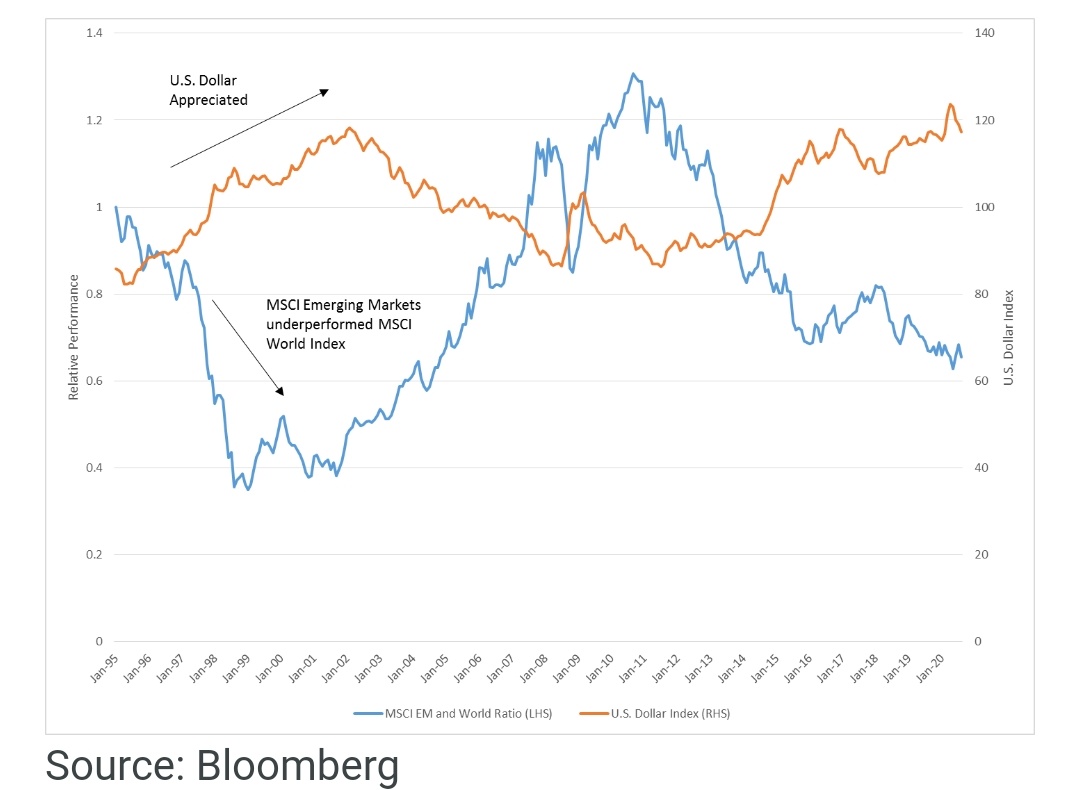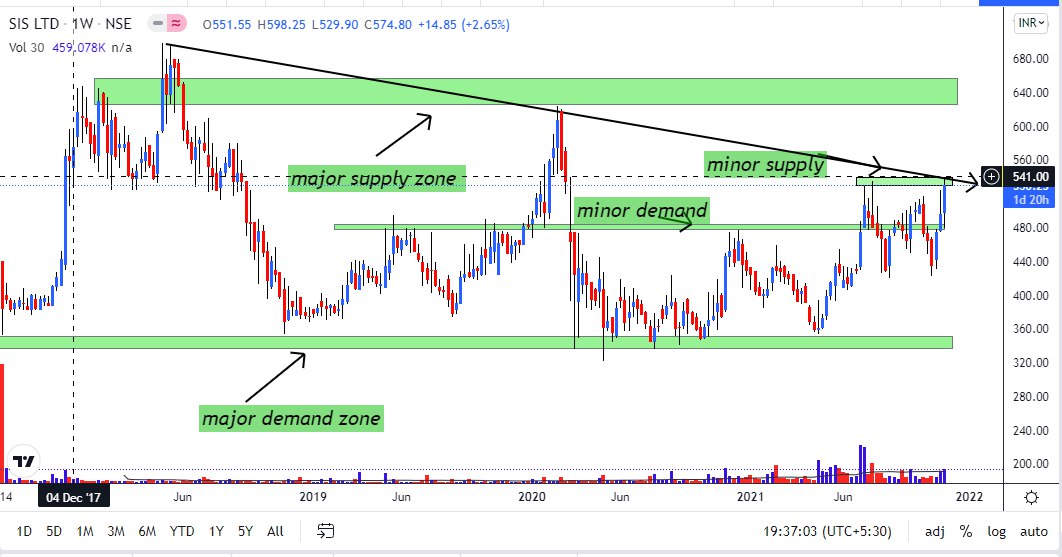2/15
A simple thread to understand relationship between US Dollar and Emerging Markets.
The relationship between the performance of Emerging Market stocks and the US Dollar is one of the tightest macro relationships that exists in investing.
1/15
2/15
When US Dollar weakens, EM index outperform World Index and when US Dollar strengthens EM index underperform World index.
3/15

Then from 2001 to 2010, the U.S. dollar depreciated over 18% while the MSCI EM Index outperformed the MSCI World Index by 14% annualised.
4/15
Overall, from 1995 to 2020, this relationship has a correlation of -0.35.
5/15
A weaker dollar allows Emerging Market countries more freedom to provide fiscal stimulus without fearing negative implications for their own economies.
6/15
As case with India, government will be more comfortable to push fiscal stimulus now when INR is stable.
7/15
Emerging markets are a natural choice as they tend to benefit from weakening dollar and grow faster than DMs.
8/15
9/15
10/15
Easy monetary policy weakens the dollar and leads to its depreciation. Since U.S. dollar is a fiat currency, meaning that it is not backed by gold, it can be created anytime easily.
11/15
12/15
13/15
14/15
Since US Fed has expanded its Balance Sheet at record speed, US Dollar may go through a weak patch.
Taking cue from multiple cycles in the past, if US Dollar continues to weaken, Emerging Market stocks may outperform.
Watch this trend closely!
15/15 End
Edelweiss Emerging Market Opportunities Equity Offshore Fund
https://t.co/ea0nbUxAmF
Edelweiss Greater China Equity Offshore Fund
https://t.co/AXEWzfKdhY
More from Finance
Here’s what "financial wellness" means to me
⬇️⬇️⬇️⬇️⬇️⬇️⬇️⬇️⬇️⬇️
2/ Mindset
Humans are programmed to think short-term
Evolutionary, thinking short-term makes sense. It helps with survival.
Financial wellness is all about training yourself to develop a long-term mindset
Not easy -- it takes practice

3/ Mindset
If you join the right tribes, you can’t help but improve
My favs:
@AffordAnything
@ChooseFiFI
FinTwit
@MicroCapClub
@themotleyfoolFool
@visualizevalue
Twitter / Podcasts / Blogs / YouTube -- when used correctly -- are amazing
1/ YouTube is an AMAZING resource when used properly (Thread)
— Brian Feroldi (@BrianFeroldi) November 7, 2020
Here are my favorite YouTube channels:
Top 5:
Mark Rober - @MarkRober
Real Engineering
Smarter Every Day - @smartereveryday
Stuff Made Here - @stuffmadehere
Wintegartan - @wintergatan
More \U0001f447\U0001f447\U0001f447\U0001f447\U0001f447
4/ Mindset
Educate yourself - constantly!
Especially about:
1⃣Money
2⃣Relationships
3⃣Health
These 3 categories have an outsized influence on all areas of your life
Books
1/ Book recommendations (thread)
— Brian Feroldi (@BrianFeroldi) November 20, 2020
Start Here:
Choose FI
Richest Man in Babylon
Millionaire Next Door
Rich Dad, Poor Dad
The Wealthy Barber
\u2b07\ufe0f\u2b07\ufe0f\u2b07\ufe0f\u2b07\ufe0f\u2b07\ufe0f
5/ Career
In the beginning, focus on growing your income
Do more than what is expected
Become a lynchpin
Find a career that you ENJOY (<- important!) that also has high-income potential
Start a side hustle (<- important!)
Build your talent
Boosting your salary is a great way to turbo-charge wealth building
— Brian Feroldi (@BrianFeroldi) November 1, 2020
Here's the good news: Your salary is negotiable!@themotleyfool and @ChooseFi have some AMAZING free resources for scoring a big raise:
Use them!
\U0001f447\U0001f447\U0001f447
For a naked option to make money, it's better if IV rises or at least stays flat.
Rule 3 : DO NOT run or trade everything that moves. Focus on a few stocks and master them. When a move comes, make the max out of that move.
— Subhadip Nandy (@SubhadipNandy16) October 14, 2021
Example : in this crazy mkt, I did not even trade TataMotors this week. Stayed focussed on ITC and it gave good returns https://t.co/41wkugZg1I
This is a thread I wrote on IV, IVR etc
IV - A thread
— Subhadip Nandy (@SubhadipNandy16) September 20, 2018
In financial mathematics, implied volatility of an option contract is
that value of the volatility of the underlying instrument which, when
input in an option pricing model ) will return a theoretical value equal to the current market price of the option (1/n)
You May Also Like
A small tribute/gift to members
Screeners
technical screeners - intraday and positional both
before proceeding - i have helped you , can i ask you so that it can help someone else too
thank you
positional one
run - find #stock - draw chart - find levels
1- Stocks closing daily 2% up from 5 days
https://t.co/gTZrYY3Nht
2- Weekly breakout
https://t.co/1f4ahEolYB
3- Breakouts in short term
https://t.co/BI4h0CdgO2
4- Bullish from last 5
intraday screeners
5- 15 minute Stock Breakouts
https://t.co/9eAo82iuNv
6- Intraday Buying seen in the past 15 minutes
https://t.co/XqAJKhLB5G
7- Stocks trading near day's high on 5 min chart with volume BO intraday
https://t.co/flHmm6QXmo
Thank you





















